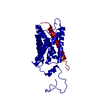+ Open data
Open data
- Basic information
Basic information
| Entry | Database: EMDB / ID: EMD-5679 | |||||||||
|---|---|---|---|---|---|---|---|---|---|---|
| Title | Electron Microscopy of the Aquaporin-0/Calmodulin Complex | |||||||||
 Map data Map data | 3D Reconstruction of the Aquaporin-0/Calmodulin Complex | |||||||||
 Sample Sample |
| |||||||||
 Keywords Keywords | aquaporin / calmodulin / calcium regulation / water channel / membrane protein complex / electron microscopy | |||||||||
| Function / homology |  Function and homology information Function and homology informationmaintenance of lens transparency / cell adhesion mediator activity / homotypic cell-cell adhesion / gap junction-mediated intercellular transport / water transport / water channel activity / : / : / : / : ...maintenance of lens transparency / cell adhesion mediator activity / homotypic cell-cell adhesion / gap junction-mediated intercellular transport / water transport / water channel activity / : / : / : / : / : / positive regulation of protein autophosphorylation / structural constituent of eye lens / negative regulation of peptidyl-threonine phosphorylation / : / type 3 metabotropic glutamate receptor binding / lens development in camera-type eye / positive regulation of peptidyl-threonine phosphorylation / anchoring junction / CaM pathway / Cam-PDE 1 activation / Sodium/Calcium exchangers / Calmodulin induced events / positive regulation of DNA binding / Reduction of cytosolic Ca++ levels / Activation of Ca-permeable Kainate Receptor / CREB1 phosphorylation through the activation of CaMKII/CaMKK/CaMKIV cascasde / response to corticosterone / Loss of phosphorylation of MECP2 at T308 / CREB1 phosphorylation through the activation of Adenylate Cyclase / negative regulation of high voltage-gated calcium channel activity / PKA activation / CaMK IV-mediated phosphorylation of CREB / Glycogen breakdown (glycogenolysis) / CLEC7A (Dectin-1) induces NFAT activation / Activation of RAC1 downstream of NMDARs / negative regulation of ryanodine-sensitive calcium-release channel activity / organelle localization by membrane tethering / mitochondrion-endoplasmic reticulum membrane tethering / autophagosome membrane docking / negative regulation of calcium ion export across plasma membrane / regulation of cardiac muscle cell action potential / nitric-oxide synthase binding / presynaptic endocytosis / regulation of synaptic vesicle exocytosis / Synthesis of IP3 and IP4 in the cytosol / regulation of cell communication by electrical coupling involved in cardiac conduction / Phase 0 - rapid depolarisation / calcineurin-mediated signaling / Negative regulation of NMDA receptor-mediated neuronal transmission / Unblocking of NMDA receptors, glutamate binding and activation / RHO GTPases activate PAKs / Ion transport by P-type ATPases / adenylate cyclase binding / Uptake and function of anthrax toxins / regulation of ryanodine-sensitive calcium-release channel activity / Long-term potentiation / protein phosphatase activator activity / positive regulation of protein serine/threonine kinase activity / Calcineurin activates NFAT / Regulation of MECP2 expression and activity / DARPP-32 events / Smooth Muscle Contraction / regulation of synaptic vesicle endocytosis / detection of calcium ion / regulation of cardiac muscle contraction / catalytic complex / RHO GTPases activate IQGAPs / regulation of cardiac muscle contraction by regulation of the release of sequestered calcium ion / activation of adenylate cyclase activity / phosphatidylinositol 3-kinase binding / calcium channel inhibitor activity / Activation of AMPK downstream of NMDARs / cellular response to interferon-beta / positive regulation of nitric-oxide synthase activity / presynaptic cytosol / Protein methylation / enzyme regulator activity / regulation of release of sequestered calcium ion into cytosol by sarcoplasmic reticulum / eNOS activation / titin binding / Ion homeostasis / Tetrahydrobiopterin (BH4) synthesis, recycling, salvage and regulation / regulation of calcium-mediated signaling / sperm midpiece / voltage-gated potassium channel complex / visual perception / FCERI mediated Ca+2 mobilization / calcium channel complex / substantia nigra development / regulation of heart rate / Ras activation upon Ca2+ influx through NMDA receptor / FCGR3A-mediated IL10 synthesis / Antigen activates B Cell Receptor (BCR) leading to generation of second messengers / calyx of Held / response to amphetamine / nitric-oxide synthase regulator activity / adenylate cyclase activator activity / sarcomere / protein serine/threonine kinase activator activity Similarity search - Function | |||||||||
| Biological species |   Homo sapiens (human) Homo sapiens (human) | |||||||||
| Method | single particle reconstruction / negative staining / Resolution: 25.0 Å | |||||||||
 Authors Authors | Reichow SL / Clemens DM / Freites JA / Nemeth-Cahalan KL / Heyden M / Tobias DJ / Hall JE / Gonen T | |||||||||
 Citation Citation |  Journal: Nat Struct Mol Biol / Year: 2013 Journal: Nat Struct Mol Biol / Year: 2013Title: Allosteric mechanism of water-channel gating by Ca2+-calmodulin. Authors: Steve L Reichow / Daniel M Clemens / J Alfredo Freites / Karin L Németh-Cahalan / Matthias Heyden / Douglas J Tobias / James E Hall / Tamir Gonen /  Abstract: Calmodulin (CaM) is a universal regulatory protein that communicates the presence of calcium to its molecular targets and correspondingly modulates their function. This key signaling protein is ...Calmodulin (CaM) is a universal regulatory protein that communicates the presence of calcium to its molecular targets and correspondingly modulates their function. This key signaling protein is important for controlling the activity of hundreds of membrane channels and transporters. However, understanding of the structural mechanisms driving CaM regulation of full-length membrane proteins has remained elusive. In this study, we determined the pseudoatomic structure of full-length mammalian aquaporin-0 (AQP0, Bos taurus) in complex with CaM, using EM to elucidate how this signaling protein modulates water-channel function. Molecular dynamics and functional mutation studies reveal how CaM binding inhibits AQP0 water permeability by allosterically closing the cytoplasmic gate of AQP0. Our mechanistic model provides new insight, only possible in the context of the fully assembled channel, into how CaM regulates multimeric channels by facilitating cooperativity between adjacent subunits. | |||||||||
| History |
|
- Structure visualization
Structure visualization
| Movie |
 Movie viewer Movie viewer |
|---|---|
| Structure viewer | EM map:  SurfView SurfView Molmil Molmil Jmol/JSmol Jmol/JSmol |
| Supplemental images |
- Downloads & links
Downloads & links
-EMDB archive
| Map data |  emd_5679.map.gz emd_5679.map.gz | 458.7 KB |  EMDB map data format EMDB map data format | |
|---|---|---|---|---|
| Header (meta data) |  emd-5679-v30.xml emd-5679-v30.xml emd-5679.xml emd-5679.xml | 13.2 KB 13.2 KB | Display Display |  EMDB header EMDB header |
| Images |  emd_5679.tif emd_5679.tif | 287.7 KB | ||
| Archive directory |  http://ftp.pdbj.org/pub/emdb/structures/EMD-5679 http://ftp.pdbj.org/pub/emdb/structures/EMD-5679 ftp://ftp.pdbj.org/pub/emdb/structures/EMD-5679 ftp://ftp.pdbj.org/pub/emdb/structures/EMD-5679 | HTTPS FTP |
-Related structure data
| Related structure data |  3j41MC M: atomic model generated by this map C: citing same article ( |
|---|---|
| Similar structure data |
- Links
Links
| EMDB pages |  EMDB (EBI/PDBe) / EMDB (EBI/PDBe) /  EMDataResource EMDataResource |
|---|---|
| Related items in Molecule of the Month |
- Map
Map
| File |  Download / File: emd_5679.map.gz / Format: CCP4 / Size: 1.1 MB / Type: IMAGE STORED AS FLOATING POINT NUMBER (4 BYTES) Download / File: emd_5679.map.gz / Format: CCP4 / Size: 1.1 MB / Type: IMAGE STORED AS FLOATING POINT NUMBER (4 BYTES) | ||||||||||||||||||||||||||||||||||||||||||||||||||||||||||||||||||||
|---|---|---|---|---|---|---|---|---|---|---|---|---|---|---|---|---|---|---|---|---|---|---|---|---|---|---|---|---|---|---|---|---|---|---|---|---|---|---|---|---|---|---|---|---|---|---|---|---|---|---|---|---|---|---|---|---|---|---|---|---|---|---|---|---|---|---|---|---|---|
| Annotation | 3D Reconstruction of the Aquaporin-0/Calmodulin Complex | ||||||||||||||||||||||||||||||||||||||||||||||||||||||||||||||||||||
| Projections & slices | Image control
Images are generated by Spider. | ||||||||||||||||||||||||||||||||||||||||||||||||||||||||||||||||||||
| Voxel size | X=Y=Z: 3.98 Å | ||||||||||||||||||||||||||||||||||||||||||||||||||||||||||||||||||||
| Density |
| ||||||||||||||||||||||||||||||||||||||||||||||||||||||||||||||||||||
| Symmetry | Space group: 1 | ||||||||||||||||||||||||||||||||||||||||||||||||||||||||||||||||||||
| Details | EMDB XML:
CCP4 map header:
| ||||||||||||||||||||||||||||||||||||||||||||||||||||||||||||||||||||
-Supplemental data
- Sample components
Sample components
-Entire : Aquaporin-0 bound to Calmodulin
| Entire | Name: Aquaporin-0 bound to Calmodulin |
|---|---|
| Components |
|
-Supramolecule #1000: Aquaporin-0 bound to Calmodulin
| Supramolecule | Name: Aquaporin-0 bound to Calmodulin / type: sample / ID: 1000 Details: Sample was prepared for electron microscopy with negative stain Oligomeric state: One tetramer of Aquaporin-0 bound to 2 molecules of Calmodulin Number unique components: 2 |
|---|---|
| Molecular weight | Experimental: 130 KDa / Theoretical: 130 KDa / Method: Size-exclusion Chromatography and SDS-PAGE |
-Macromolecule #1: Aquaporin-0
| Macromolecule | Name: Aquaporin-0 / type: protein_or_peptide / ID: 1 / Name.synonym: AQP0, MIP / Details: Crosslinked to Calmodulin using EDC/NHS / Number of copies: 4 / Oligomeric state: tetramer / Recombinant expression: No / Database: NCBI |
|---|---|
| Source (natural) | Organism:  |
| Molecular weight | Experimental: 25 KDa / Theoretical: 25 KDa |
| Sequence | UniProtKB: Pas12 / InterPro: Major intrinsic protein |
-Macromolecule #2: Calmodulin
| Macromolecule | Name: Calmodulin / type: protein_or_peptide / ID: 2 / Name.synonym: CaM / Details: Calmodulin crosslinked to Aquaporin-0 / Number of copies: 2 / Oligomeric state: monomer / Recombinant expression: Yes |
|---|---|
| Source (natural) | Organism:  Homo sapiens (human) / synonym: Human / Location in cell: cytoplasmic Homo sapiens (human) / synonym: Human / Location in cell: cytoplasmic |
| Molecular weight | Experimental: 17 KDa / Theoretical: 17 KDa |
| Recombinant expression | Organism:  |
| Sequence | UniProtKB: Calmodulin-3 |
-Experimental details
-Structure determination
| Method | negative staining |
|---|---|
 Processing Processing | single particle reconstruction |
| Aggregation state | particle |
- Sample preparation
Sample preparation
| Concentration | 0.02 mg/mL |
|---|---|
| Buffer | pH: 7.4 / Details: 25mM HEPES, 5mM CaCl2, 0.3% decylmaltoside |
| Staining | Type: NEGATIVE / Details: 0.75% uranyl formate |
| Grid | Details: 400 mesh carbon coated grid (Ted Pella) |
| Vitrification | Cryogen name: NONE / Instrument: OTHER |
- Electron microscopy
Electron microscopy
| Microscope | FEI TECNAI 12 |
|---|---|
| Alignment procedure | Legacy - Astigmatism: Objective lens astigmatism was corrected at 100,000 times magnification Legacy - Electron beam tilt params: 0 |
| Date | Feb 25, 2010 |
| Image recording | Category: FILM / Film or detector model: KODAK SO-163 FILM / Digitization - Scanner: NIKON SUPER COOLSCAN 9000 / Digitization - Sampling interval: 6.35 µm / Number real images: 200 / Average electron dose: 15 e/Å2 / Bits/pixel: 16 |
| Tilt angle min | 0 |
| Electron beam | Acceleration voltage: 120 kV / Electron source: LAB6 |
| Electron optics | Calibrated magnification: 52000 / Illumination mode: FLOOD BEAM / Imaging mode: BRIGHT FIELD / Cs: 2 mm / Nominal defocus max: 2.0 µm / Nominal defocus min: 1.0 µm / Nominal magnification: 52000 |
| Sample stage | Specimen holder model: OTHER / Tilt angle max: 50 |
- Image processing
Image processing
| Details | Particles were selected from a tilted pair dataset at 0 and 50 degree tilt using SPIDER. An initial reconstruction was generated using random conical tilt methods in SPIDER and refined in FREALIGN |
|---|---|
| CTF correction | Details: CTF-TILT, each micrograph |
| Final reconstruction | Algorithm: OTHER / Resolution.type: BY AUTHOR / Resolution: 25.0 Å / Resolution method: FSC 0.5 CUT-OFF / Software - Name: SPIDER, FREALIGN Details: Final Map with C2 Symmetry and Filtered to 25 Angstrom Number images used: 11720 |
 Movie
Movie Controller
Controller



 UCSF Chimera
UCSF Chimera


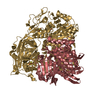
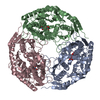

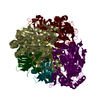

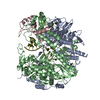

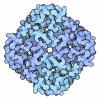







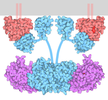

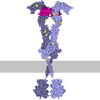
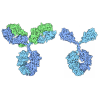

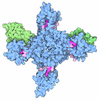
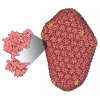


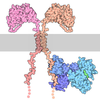

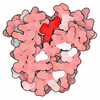

 Z (Sec.)
Z (Sec.) Y (Row.)
Y (Row.) X (Col.)
X (Col.)





















